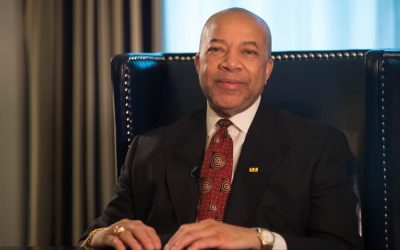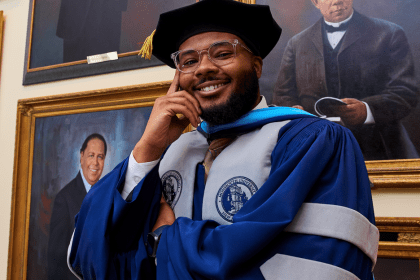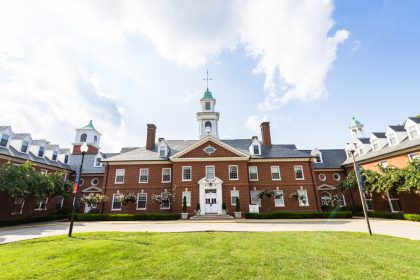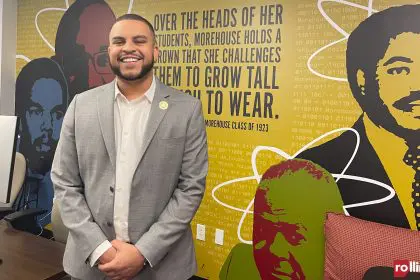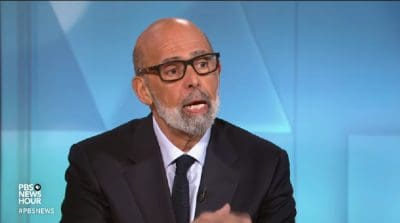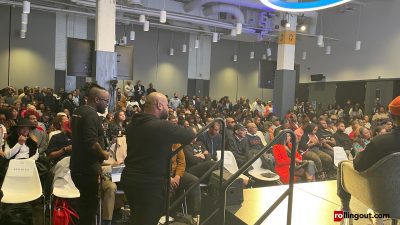 Thomas Dortch Jr. is one of the most well-respected and successful African American entrepreneurs in Atlanta and the nation — and probably the only one who describes himself as a “day laborer.”
Thomas Dortch Jr. is one of the most well-respected and successful African American entrepreneurs in Atlanta and the nation — and probably the only one who describes himself as a “day laborer.”
“I get up every day and go to work,” says the Toccoa, Georgia, native, who acquired an appreciation for learning, developed a connection to community, and accepted a responsibility to give back while growing up in the segregated South. As an adult, he spent more than two decades working in state government and politics before following his father’s example and starting his own business.
Dortch credits his success to his parents and teachers in the all-Black schools he attended during his childhood, where he made his mark as a student-athlete, playing forward on the basketball team and excelling in math and science in the classroom, before graduating second in his high school’s senior class – a mere 0.2 percent separating him and the valedictorian, he noted. In those days, Dortch recalls, teachers didn’t tolerate excuses. “You had to learn. You had to perform,” he adds. “I loved it.”
Like many of his high school teachers, he enrolled at Fort Valley State University, where he received a bachelor’s degree in sociology in 1972. He would later receive a master’s degree in criminal justice administration in 1986 from Clark-Atlanta University. He also attended Georgia State University as a Ford Fellow in the Urban Administration Program. Dortch was the first African American executive for the Democratic Party of Georgia, and at age 23, served as its associate director. He went to work in 1978 for U.S. Senator Sam Nunn as the state executive assistant. In 1990, he became the first state director for a U. S. senator in U. S. Senate history. In 1994, he opened his first business, TWD Inc., a private firm specializing in business development, fundraising, marketing, performance management and management consulting. Between 1994 and 2013, he would launch five other diversified businesses and become a multimillionaire.
In addition to being a serial entrepreneur, he is also a social entrepreneur, lending his time, energy and expertise to several nonprofit organizations, including serving as chairman emeritus of 100 Black Men of America Inc., which works to improve the quality of life and enhance the educational and economic opportunities for African American young people, and founding the National Black College Alumni Hall of Fame Foundation, Inc., which is dedicated to the growth and development of historically black college and universities. The National Black College Alumni Hall of Fame will celebrate its 30th Anniversary Hall of Fame weekend Sept. 24-27 at the Hyatt Regency Atlanta.
Tell us a little about your businesses.
Sam Nunn helped launch my entrepreneurial career by becoming the first client of my consulting firm. My next company, Atlanta Transportation Systems, was launched in 1995 upon winning a contract with Fulton County, [Georgia], government. Cornerstone Parking was my third company, and following that came FAD Consulting in 2000, which began to design the programs for inclusion at Atlanta’s Hartsfield-Jackson [International] Airport. LANCOR Parking, of which I am the majority owner, was my fourth company. Two years ago, we started the Better Dreams Mattress Company, specializing in mattresses for dormitories.
What inspired you to become an entrepreneur?
In working with Senator Nunn, I helped develop several millionaires and multimillionaires in the African American community and decided in 1994 [that] if this is working for them it should work for me. … The other thing that motivated me was recognition of the business principle and understanding in life that no matter how good you are, and no matter what you do, and no matter how well people will like you, you’ll never be paid what you’re worth, in most cases, working for somebody else. Sam Nunn was a great friend and mentor, but the staff could only make so much money, so for me there were too many restrictions established by the U. S. Senate.
In addition to being a businessman, you call yourself a social entrepreneur. What do you mean by that?
I love business. I love creating jobs. I also love what success in business can do for others. The late Dr. Myles Munroe was a very good friend of mine. In his book called The Principles and Power of Vision, he said that the most valuable real estate in the world are the graveyards, where people went to their graves with knowledge and talent and skill. He said you have to die empty. I get up every day trying to empty my life for others. That’s part of what I learned from my parents growing up. That’s what I tell people today.
Please share three business principles that are most important to you.
– There are those of our color who are not of our kind, and those of our kind who are not of our color. That means everybody Black is not for you, and everybody White and other colors aren’t against you.
– You can do well while doing good, so you’ve got to give back.
– Every person has value.
You are a proud HBCU graduate of Fort Valley State University and Clark Atlanta University as well as founder of the National Black College Alumni Hall of Fame. What impact did the HBCU experience have on you, personally and professionally?
Going to Fort Valley gave me the opportunity to grow as an individual. I was not judged by the small town I came from. I was not judged based on whether I could or could not play basketball. I got a scholarship for academics. Fort Valley provided us a foundation that prepared us for life in a greater society. You were free to be leaders and express yourself. You had people in the classroom you had to compete with every day. You were encouraged to speak up, speak out. In addition to my undergraduate and graduate degrees, I have five honorary doctorate degrees from HBCUs, and I made sure all of my children went to HBCUs.
UNCF President Michael Lomax has been a leader in education for years. Under his leadership, Koch Industries and the Charles Koch Foundation gave $25 million to UNCF to establish the UNCF/Koch Scholars program, award scholarships to deserving Black college and college-bound students, help financially struggling UNCF-member HBCUs and fund other UNCF initiatives. Would you say that kind of donation is important? Why?
I think it’s good [UNCF] got the $25 million. … Let’s say that company didn’t give us the $25 million. That’s $25 million Black folks are not putting into UNCF. That’s $25 million that people who have the wherewithal to help UNCF haven’t helped UNCF. They’re taking that money to do good, so because of that there are going to be students at historically black colleges who are going to get the scholarship support they don’t have. That’s going to help UNCF. My attitude is why don’t we hold accountable a lot of our own businesses that are making money and aren’t investing in our HBCUs or UNCF and aren’t giving back to help build our communities. We have a lot of successful African Americans in sports and entertainment as well who aren’t doing anything. I just hope they will give more money so we can do more things to ensure that more of our young people will have an opportunity for a higher education.
Is there anything more you’d like to say about the National Black College Alumni Hall of Fame, the 30th anniversary weekend festivities or your beloved HBCUs?
Please join us for the 30th anniversary of the National Black College Alumni Hall of Fame, Sept. 24-27, 2015, at the Hyatt Regency Hotel Atlanta. This year’s event will be chaired by [film producer and Florida A&M University graduate] Will Packer. Visit our website at www.nbcahof.org for a list of inductees and activities.
— Pat Burson George


